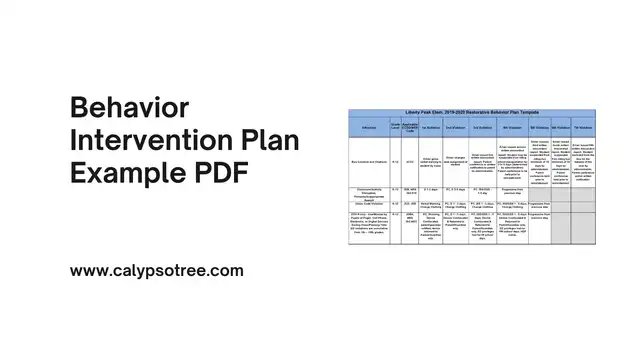A software engineer intern works with a company to learn how to become a software engineer. This job description for a software engineer intern helps you understand what you will do and what skills you need. Internships give you real-world experience, helping you build a strong foundation for your future career.
What is a Software Engineer Intern?
A software engineer intern is a person who is learning to become a software engineer. They usually work at a company briefly to get real-world experience. This internship helps them understand what working as a software engineer is like.
Why Internships are Important:
Internships are very important for several reasons:
- Learning by Doing: Interns learn best by doing tasks themselves. Writing code, testing, and fixing bugs help them improve their skills.
- Applying School Knowledge: Practical experience lets interns apply what they learned in school.
- Gaining Confidence:
- Working on real projects gives interns confidence. They see that they can solve problems and create software that works.
- Building a Portfolio: Interns can add their work to their portfolio. This shows future employers what they can do. A strong portfolio can help them get a job after their internship.
- Understanding the Industry: Practical experience helps interns understand how the software industry works.
What Does a Software Engineer Intern Do?
General Description of Intern Duties:
A software engineer intern helps with many tasks in a company. Here are some of the main duties:
- Writing Code: Interns write code for new software. They also help improve existing software by adding new features.
- Testing Software: Interns test the software to find any problems or bugs.
- Bug Fixing: When interns find bugs, they work on fixing them.
- Working on Projects: Interns often work on different projects. They help build new apps or improve old ones.
- Creating Documentation: Interns help write instructions and guides. This documentation writing helps other people understand how to use the software.
- Attending Meetings: Interns join team meetings. They learn about the project goals and what software intern tasks need to be done. Meetings help them stay updated and connected with the team.
Importance of Practical Experience:
Practical experience is very important for a software engineer intern. Here’s why:
- Applying Knowledge: Practical experience lets interns apply what they learned in school.
- Learning by Doing: Interns learn best by doing tasks themselves. Writing code, code testing, and fixing bugs help them improve their skills.
- Gaining Confidence: Working on real projects gives interns confidence. They see that they can solve problems and create software that works.
- Building a Portfolio: Interns can add their work to their portfolio. This shows future employers what they can do. A strong portfolio can help them get a job after their internship.
- Understanding the Industry: Practical experience helps interns understand how the software industry works. They learn about the tools and processes used by professionals.
Skills Required for a Software Engineer Intern
Technical Skills for Interns (Programming Languages, Tools):
A software engineer intern needs several technical skills. Here are some important ones:
- Programming Languages: Interns should know how to code in languages like Java, Python, or C++. These are common languages used in software development.
- Version Control Systems: Knowing how to use version control systems like Git is important. These systems help keep track of changes in the code.
- Development Tools: Interns should be familiar with tools like Visual Studio Code or Eclipse. These tools make writing and editing code easier.
- Testing Tools: Understanding how to use testing tools is important. These tools help find bugs and ensure the software works well.
- Databases: Knowing how to work with databases is useful. This includes understanding how to store and retrieve data.
Soft Skills (Communication, Teamwork):
Soft skills are also very important for a software engineer intern. Here are some key soft skills:
- Communication: Interns need good communication skills. Good communication helps the team work better together.
- Teamwork: Interns work closely with other team members. This means helping others, sharing ideas, and working together to solve problems.
- Problem-Solving: Interns need strong problem-solving skills. They must be able to find and fix issues in the software.
- Adaptability: Interns should be adaptable. This means being able to learn new things quickly and adjust to changes. The software industry is always evolving, so being adaptable is important.
- Time Management: Good time management skills help interns complete their tasks on time.
By understanding what a software engineer intern does and knowing the skills required, you can be well-prepared for this role. Practical experience and a mix of technical and soft skills will help you succeed as a software engineer intern.
Typical Responsibilities of a Software Engineer Intern
Daily Tasks and Duties:
A software engineer intern has many tasks to do each day. Here are some of their main duties:
- Writing Code: Interns spend a lot of time writing code. They help create new software and add features to existing software. This helps them practice their programming intern skills.
- Testing Code: Interns test the code to make sure it works correctly. They look for bugs or problems and try to fix them. Testing is important to make sure the software is good quality.
- Debugging: When interns find bugs, they help fix them. Debugging means finding what is wrong with the code and solving the problem. This helps make the software better.
- Attending Meetings: Interns go to team meetings. These meetings help them understand what the project is about and what they need to do. They also get a chance to share their ideas.
- Learning from Mentors: Interns learn from senior engineers and mentors. They get feedback on their work and advice on how to improve. Mentors help interns grow and learn.
- Working on Documentation: Interns help write and update documents. This can include writing instructions for users or guides for other developers. Good documentation is important for everyone using the software.
Example Projects and Assignments:
Interns often work on different projects and assignments. Here are some examples:
- Building a Simple App: An intern might be asked to build a simple app. This helps them learn how to create software from start to finish.
- Adding Features: Interns might add new features to an existing app. This can include adding a new button or a new page. Adding features helps improve the software.
- Fixing Bugs: Interns help find and fix bugs in the software. This can involve writing tests to find bugs and then fixing the code to solve the problem.
- Creating Documentation: Interns might be asked to write guides or instructions. This helps users understand how to use the software.
- Working on Team Projects: Interns often work on projects with other team members. This helps them learn how to collaborate and share ideas.
Contribution to Projects
How Interns Support Project Goals:
Interns play an important role in helping projects succeed. Here is how they support project goals:
- Completing Tasks: Interns help complete tasks that are part of the project. This can include writing code, testing, or creating documentation. Completing tasks helps the project move forward.
- Bringing New Ideas: Interns bring fresh ideas to the team. They can offer new ways to solve problems and improve the project. New ideas help the team find the best solutions.
- Supporting Team Members: Interns work closely with other team members. Supporting each other helps the team work better together.
Real-World Impact of Intern Contributions:
Interns can have a big impact on projects. Here are some examples:
- Improving Software Quality: By testing and debugging, interns help improve the quality of the software. Better software means happier users and fewer problems.
- Adding Valuable Features: Interns can add new features that make the software more useful.
- Speeding Up Development: Interns help speed up the development process by taking on tasks. This helps the team finish the project faster.
- Enhancing User Experience: Interns can work on making the software easier to use.
Educational Background Needed
Relevant Degrees and Coursework:
To become a software engineer intern, you need the right education. Here are some key points:
- Studying Computer Science: Most interns study computer science or a similar field. This major teaches you the basics of programming and how computers work.
- Important Courses: There are some important courses you should take. These include courses in programming languages like Java, Python, or C++. Other important courses are software engineering, network, databases, and web development.
Importance of Academic Knowledge:
Academic knowledge is very important for a software engineer intern. Here is why:
- Understanding Basics: Your classes teach you the basics of programming and software development intern.
- Learning Problem-Solving: In school, you learn how to solve problems.
- Gaining Technical Skills: Your coursework teaches you technical skills like coding internship, testing, and using development tools.
- Building a Strong Foundation: Academic knowledge gives you a strong foundation to build on.
- Preparing for Real-World Tasks: What you learn in school prepares you for the tasks you will do as an intern.
By understanding it you will be well-prepared for your role as a software engineer intern.
Tools and Technologies
Commonly Used Software and Platforms:
As a software engineer intern, you will use different software tools and platforms. Here are some common ones:
- Git: This is a version control system. You can work on code with others without messing up each other’s work.
- GitHub: This is a platform for sharing and managing code. It works with Git and lets you collaborate with others. You can also store your projects here.
- Visual Studio Code: This is a popular code editor. It helps you write and edit code easily.
- JIRA: This is a tool for tracking tasks and bugs. It helps you and your team stay organized and know what needs to be done.
- Slack: This is a messaging app. It helps you communicate with your team quickly.
- Trello: This is a tool for managing projects.
Importance of Staying Updated with New Technologies:
Technology is always changing. New tools and platforms come out all the time. As a software engineer intern, it is important to stay updated. Here are some reasons why:
- Better Tools: New tools can make your work easier and faster. Using the latest tools helps you be more efficient.
- New Skills: Learning new technologies gives you new skills.
- Improved Problem Solving: New technologies can help you solve problems in better ways.
- Competitive Edge: Knowing the latest technologies can give you an edge over others.
- Adaptability: Being able to learn and use new technologies shows that you can adapt.
Internship Duration
Typical Length of Internships:
Internships can last for different lengths of time. Here are some common durations:
- Summer Internships: These usually last for 2 to 3 months. They are popular because students are free from school during the summer.
- Semester Internships: These can last for 4 to 6 months. They usually happen during a school semester.
- Year-Long Internships: Some internships last for a full year. These are less common but can offer more experience.
Full-Time vs. Part-Time Internships:
Internships can be full-time or part-time. Here is what that means:
- Full-Time Internships: In a full-time internship, you work around 40 hours a week. This is like a regular job. You get a lot of experience and learn a lot in a short time.
- Part-Time Internships: In a part-time internship, you work fewer hours, usually around 20 hours a week. This is good if you are also going to school. You still gain experience but have more time for other things.
Both types of internships are valuable. They help you gain real-world experience and learn new skills. Whether you choose a full-time or part-time internship depends on your schedule and goals.
Collaboration with Team Members
Working with Senior Engineers and Mentors:
As a software engineer intern, you will work closely with senior engineers and mentors. Here is what that involves:
- Learning from Experience: Senior engineers have a lot of experience.
- Getting Feedback: Mentors will give you feedback on your work.
- Solving Problems Together: If you run into a problem, senior engineers and mentors can help you solve it.
- Working on Projects: You might work on technical skills for interns with senior engineers.
Role of Teamwork in Software Development:
Teamwork is very important in software development. Here is why:
- Sharing Ideas: When you work in a team, you can share ideas. Different people can bring different perspectives. This helps create better solutions.
- Helping Each Other: Team members can help each other with tasks. If someone is stuck, others can offer support. This makes the work go more smoothly.
- Dividing Tasks: In a team, you can divide tasks based on skills and strengths. This makes the project move faster and more efficiently.
- Learning Together: Working with others helps you learn new things. You can see how others approach problems and learn from them. This makes you a better intern software developer.
- Building Relationships: Teamwork helps build good relationships. Good relationships make the work environment better and more enjoyable.
Expected Salary
A software engineer intern makes an average of $26 per hour in your area. This is $0.77 more than the national average hourly salary of $25.42.(ZipRecruiter)
Average Pay Rates for Interns:
Interns can earn different amounts based on several factors. Here is a general idea:
- Hourly Rate: Most interns are paid by the hour. The average rate is around $25 to $26 per hour.
- Monthly Salary: If you work full-time, this can add up to a good monthly salary. For example, at $26 per hour, a full-time intern can earn around $4,160 a month.
Factors Influencing Intern Salaries:
Several factors can affect how much an intern is paid. Here are some of them:
- Location: Salaries can vary based on where you work. Big cities often pay more than smaller towns.
- Company Size: Large companies might pay more than smaller companies. They have bigger budgets for interns.
- Industry: Different industries can have different pay rates. For example, tech companies might pay more than non-tech companies.
- Experience: If you have more experience or skills, you might earn more. Companies value interns who can contribute more from the start.
- Duration: Some internships might pay more if they are longer. For example, year-long internships might have a higher pay rate than summer internships.
References
Career Prospects
Job Opportunities After the Internship:
Completing an internship can open many doors for you. Here is what you can expect:
- Full-Time Job Offers: Many interns are offered full-time jobs after their internship. Companies like to hire interns who have already proven themselves.
- Better Resume: Having an internship on your resume makes you more attractive to employers.
- Networking: During your internship, you meet many people in the industry.
Long-Term Career Growth:
Here is how it helps with long-term growth:
- Gaining Experience: Internships give you practical experience.
- Learning New Skills: You learn many new skills during an internship.
- Understanding the Industry: Working as an intern helps you understand how the industry works.
- Building Confidence: Completing an internship gives you confidence in your abilities.
- Career Advancement: With the experience and skills gained from an internship, you can move up the career ladder faster.
This knowledge helps you make the most of your internship and sets you up for long-term success.
Sample Job Description for a Software Engineer Intern
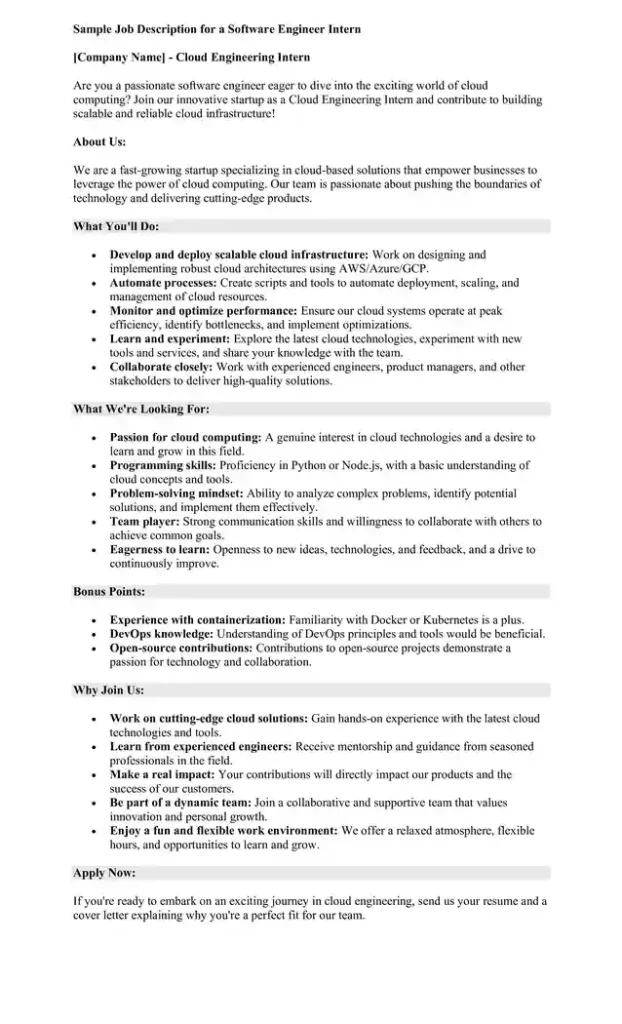
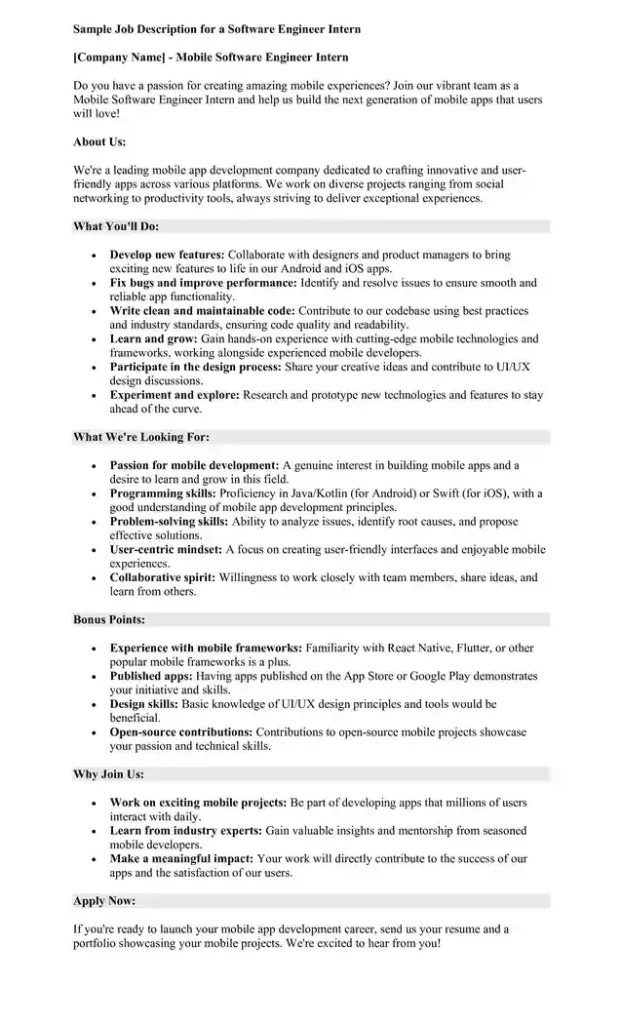
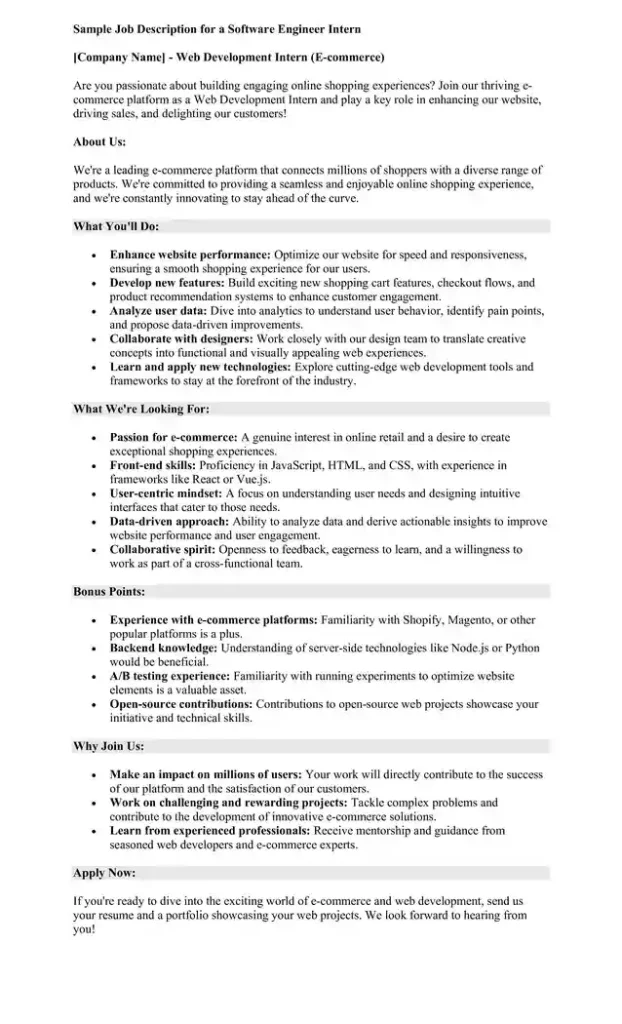
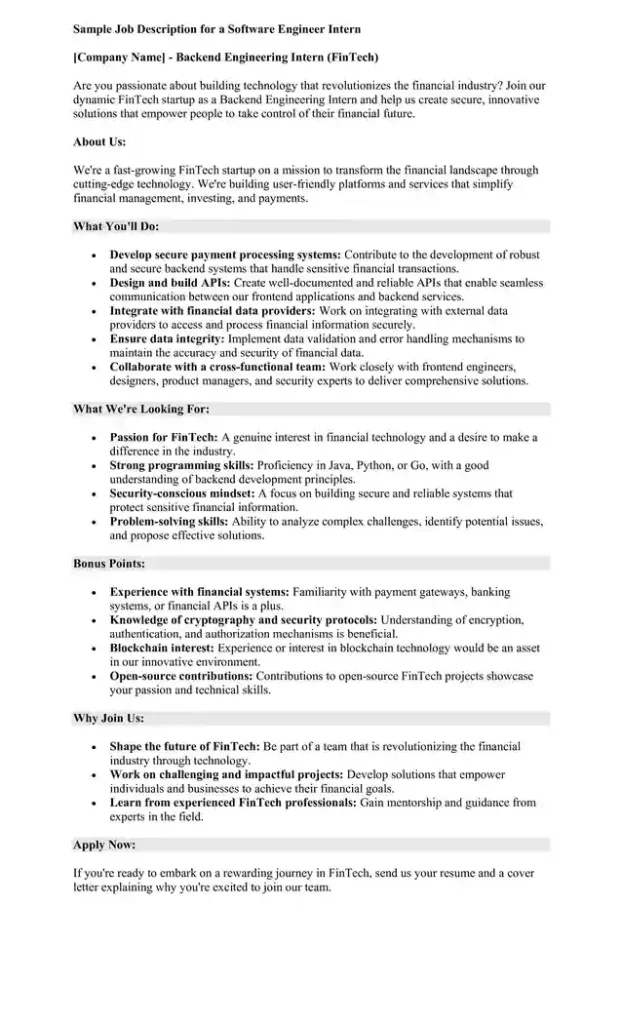
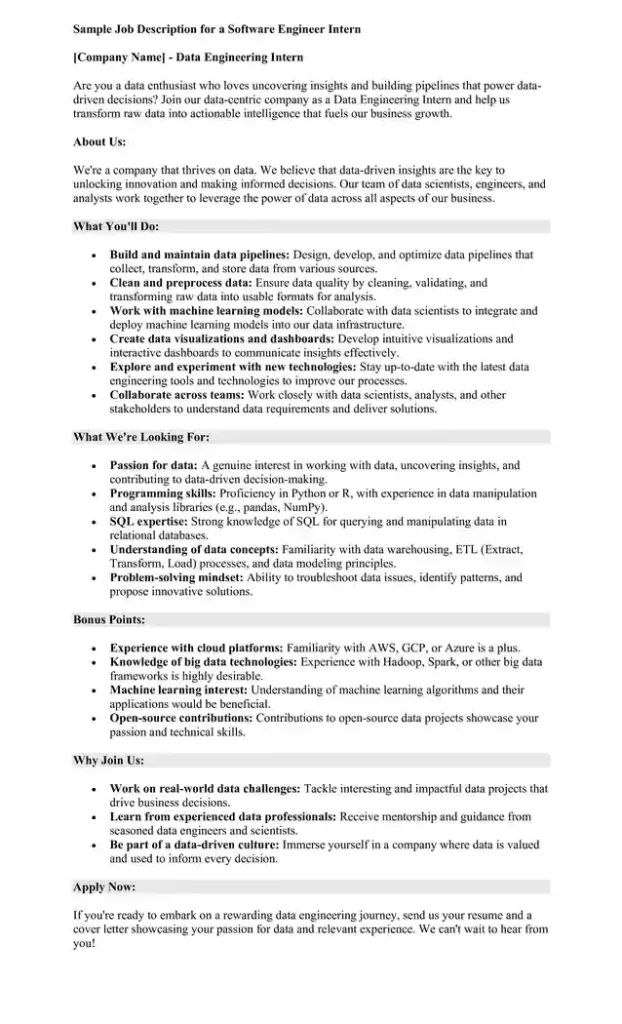
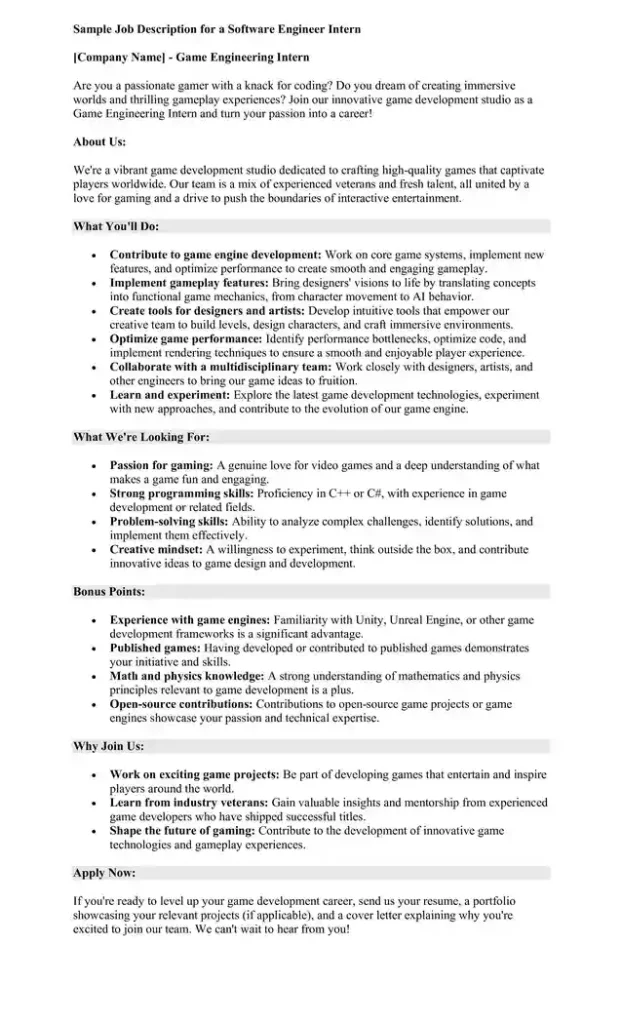
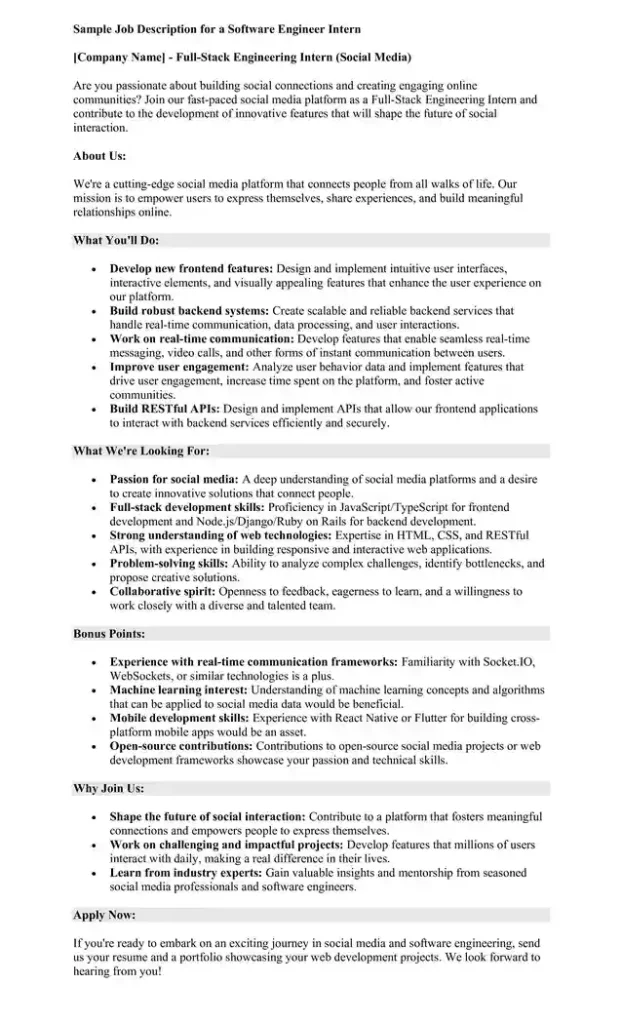
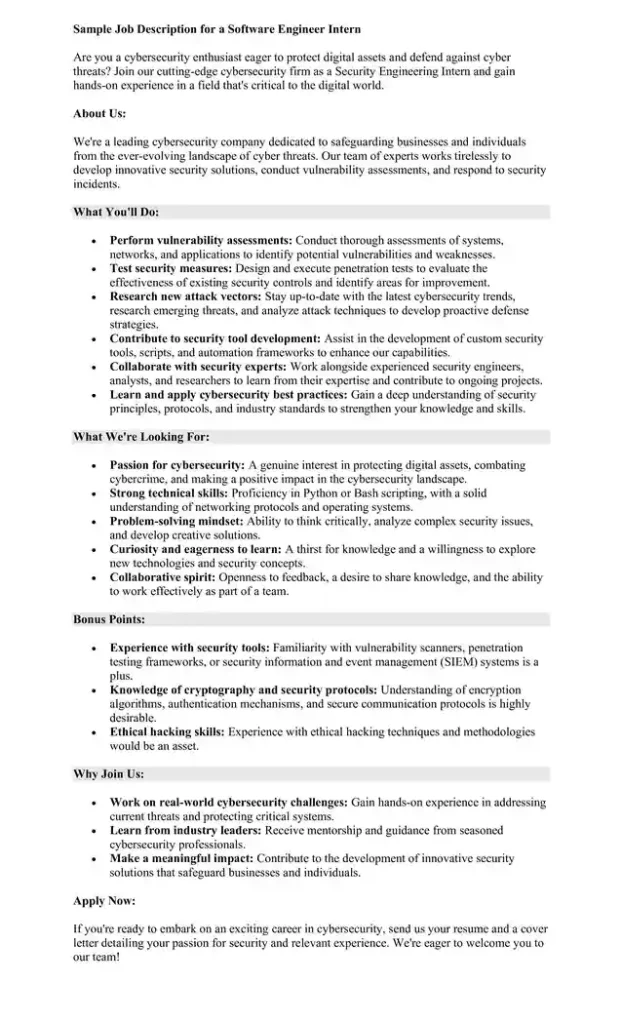
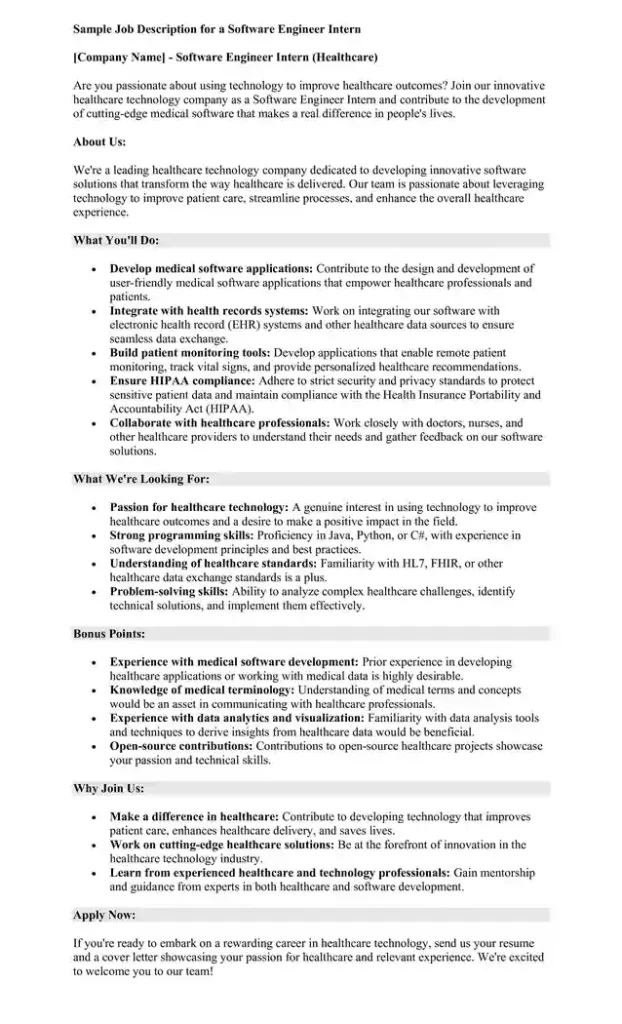
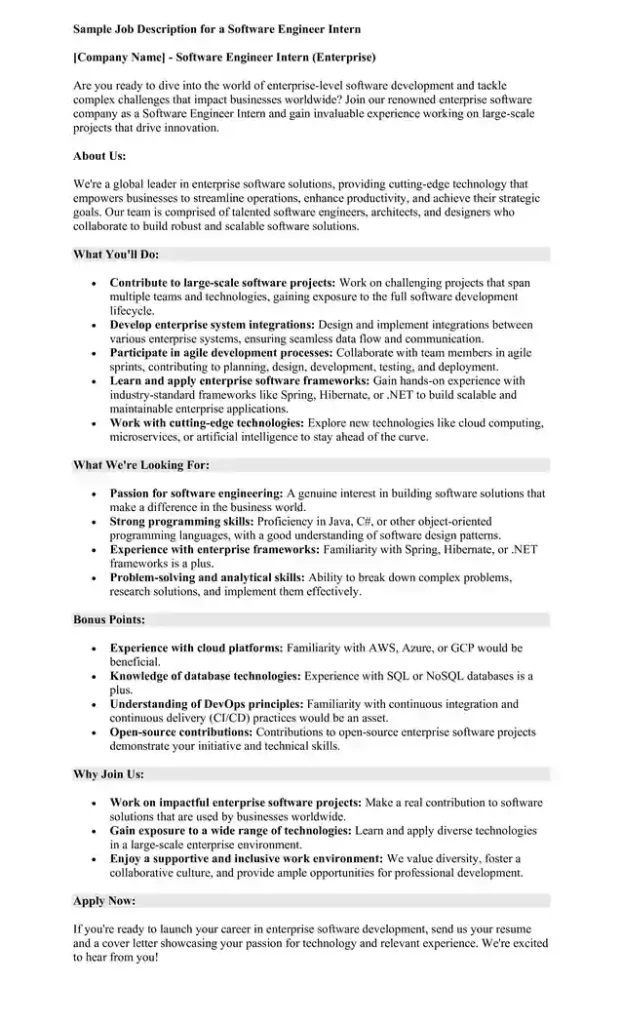
In conclusion, a software engineer internship is a great way to start your career. This job description shows that interns write code, test software, and fix bugs. These tasks help you gain the skills needed for a job in software engineering internship. With hands-on experience and a strong portfolio, you will be ready for a successful career.

Alexander is a skilled HR expert who writes clear and compelling job descriptions. He has spent over 15 years in the HR field, helping companies find and keep the best employees. With a degree in Human Resources Management from the University of Chicago, he has the knowledge to back up his experience.







